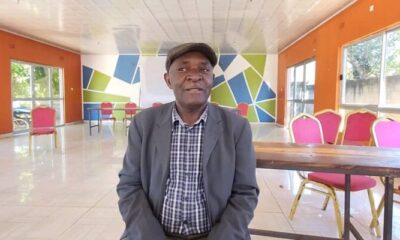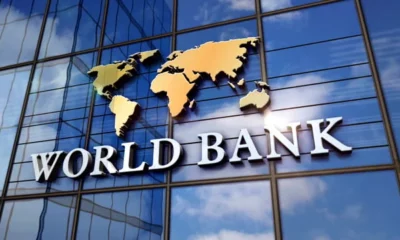Strictly Personal
Return of coups: Why Africa needs a new social contract, By Jean-Luc Stalon
Published
8 months agoon

Six decades after gaining independence, African countries are once again confronting history. Within the context of geopolitical reconfiguration and the emergence of a multipolar world, we are now witnessing a resurgence in coups across Africa.
Since the early 1960s, often after being stripped of charismatic leaders who led the independence struggle, young African states faced two major challenges: a lack of experience in state management and the grip of the former colonial powers over their political and economic future.
Many of these countries, which were led by leaders loyal to foreign powers, have not had the option or the means to meaningfully forge their own path and build strong, prosperous nations that offer hope to their people.
The trajectory of young African states was also shaken by the oil crises of the 1970s and the structural adjustment policies introduced at the behest of the Bretton Woods institutions.
To meet the demands of structural adjustment, countries had to sell off their public enterprises and make unprecedented budget cuts, including in sensitive sectors such as education, health and infrastructure.
In hindsight, all those involved later recognised that these imposed policies were devastating, calling into question the few gains made during the first two decades of independence and slowing down the modernisation of economies.
After three decades of authoritarian regimes, exploitation as well as predation of public and natural resources in the context of Cold War, the fall of the Berlin Wall signaled a decline in the system of governance of African countries and in their relations with foreign powers.
In particular, the protection of anti-communist regimes was no longer an issue for the Western powers. Henceforth, multi-party democracy was presented as one of the principles that should govern relations between Africa and the West, representing a decisive turning point in political processes in Africa.
For a large part of the population, particularly democracy activists, this gave rise to the hope of a new era marked by the freedom to choose one’s leaders and hope for a new social contract between political leaders and their populations, particularly in terms of improving the governance of public affairs and responding to the population’s aspirations for improved standards of living.
The current proliferation of coups d’états in West and Central Africa demonstrate that the expectations of hopeful populations have not been fulfilled. While multi-party elections are now regularly held, there are often shadowed by doubts regarding their transparency and fairness.
It is clear that elections alone have not been able to deliver an equitable system of governance. In other words, multi-party elections have not necessarily led to the creation of the conditions for a genuine social contract between the elites and the population.
Despite average annual economic growth of around 4 percent between 2000 and 2022, around 4 out of 10 people in Sub-Saharan Africa live below the poverty line. Unemployment and job insecurity are also taking their toll, particularly among young people.
According to the International Labour Organisation (ILO), up to 70 percent of African workers are poor, the highest rate in the world. In the social sphere, while real progress has been made, some 75 children out of every 1,000 born die before the age of five, and the primary education completion rate is only 71 percent. Finally, almost half the region’s population (49.4percent) has no access to electricity.
Meanwhile, the plundering of public funds continues and the stories of the extravagant lives of the elite grow widespread, fueling disillusionment and discontent among the masses. Hence the military coups in many countries have been welcomed as a source of liberation and a hope for positive change, with people dancing out on the streets and defying against international condemnation of the coups.
While the political events of the last three years have surprised many analysts, they were to be expected, given the brewing frustrations caused by the combined effects of poverty, poor governance, exploitation of resources by elites, and in some cases, the rise in insecurity linked to attacks by armed groups or militias.
Current trends send a strong message to the elites, both African and foreign, against the status quo and provide an opportunity to establish a new social contract between leaders and citizens. This social contract should be materialised through genuinely transparent, inclusive and fair political processes and accountability by the State to its citizens.
Africa has many solid assets to catalyse its development, most notably its dynamic demographics and youth population. According to projections, by 2100, Africa will have 4.5 billion inhabitants, or 40 percent of the world’s population – more than India, China and Europe combined.
Add to this its abundant natural resources, with 60percent of the world’s uncultivated land, unlimited solar potential and the extensive deposits of strategic resources such as cobalt, lithium and uranium.
Considering these assets, Africa can become a true global power by the end of this century. To effectively unlock its potential, African countries need to accelerate reforms to build developmental states based on strong, transparent and credible institutions, the rule of law, and a secured environment for investment and property rights that can promote structural transformation of the economy, moving from an economy based on the primary and extractive sectors to one with higher added value.
A firm commitment to infrastructure, particularly in energy and transport and the introduction of an African common market that facilitates trades across the continent using currency convertibility will be central to the success of structural transformation in Africa.
Lastly, investment in human capital that focuses on honing skills in technological innovation, digitalisation and green innovation will provide the competitive edge to spring Africa forward.
Africa has the resources and dynamism to chart its own trajectory forward, but it is now up to leaders and governments to steer in the right direction.
Jean-Luc Stalon (PhD) is Resident Representative of the United Nations Development Programme in the Central African Republic. A development practitioner for 30 years, he has just published a book entitled: La croissance élitiste, Ed. du Cygne – Paris @JLStalon
You may like
-


Intel Liftoff Hackathon 2024 calls for applications from African AI startups
-


African leaders seek change in fight against terrorism at Nigerian summit
-


Africa’s largest tech hub AfriLabs welcomes 16 new additions
-


Ethiopia’s Lemma, Kenya’s Obiri give Africa double podium finish at Boston Marathon
-


Air Peace, capitalism and national interest, By Dakuku Peterside
-


This is chaos, not governance, and we must stop it, By Tee Ngugi
Strictly Personal
Air Peace, capitalism and national interest, By Dakuku Peterside
Published
2 weeks agoon
April 16, 2024
Nigerian corporate influence and that of the West continue to collide. The rationale is straightforward: whereas corporate activity in Europe and America is part of their larger local and foreign policy engagement, privately owned enterprises in Nigeria or commercial interests are not part of Nigeria’s foreign policy ecosystem, neither is there a strong culture of government support for privately owned enterprises’ expansion locally and internationally.
The relationship between Nigerian businesses and foreign policy is important to the national interest. When backing domestic Nigerian companies to compete on a worldwide scale, the government should see it as a lever to drive foreign policy, and national strategic interest, promote trade, enhance national security considerations, and minimize distortion in the domestic market as the foreign airlines were doing, boost GDP, create employment opportunities, and optimize corporate returns for the firms.
Admitted nations do not always interfere directly in their companies’ business and commercial dealings, and there are always exceptions. I can cite two areas of exception: military sales by companies because of their strategic implications and are, therefore, part of foreign and diplomatic policy and processes. The second is where the products or routes of a company have implications for foreign policy. Air Peace falls into the second category in the Lagos – London route.
Two events demonstrate an emerging trend that, if not checked, will disincentivize Nigerian firms from competing in the global marketplace. There are other notable examples, but I am using these two examples because they are very recent and ongoing, and they are typological representations of the need for Nigerian government backing and support for local companies that are playing in a very competitive international market dominated by big foreign companies whose governments are using all forms of foreign policies and diplomacy to support and sustain.
The first is Air Peace. It is the only Nigerian-owned aviation company playing globally and checkmating the dominance of foreign airlines. The most recent advance is the commencement of flights on the Lagos – London route. In Nigeria, foreign airlines are well-established and accustomed to a lack of rivalry, yet a free-market economy depends on the existence of competition. Nigeria has significantly larger airline profits per passenger than other comparable African nations. Insufficient competition has resulted in high ticket costs and poor service quality. It is precisely this jinx that Air Peace is attempting to break.
On March 30, 2024, Air Peace reciprocated the lopsided Bilateral Air Service Agreement, BASA, between Nigeria and the United Kingdom when the local airline began direct flight operations from Lagos to Gatwick Airport in London. This elicited several reactions from foreign airlines backed by their various sovereigns because of their strategic interest. A critical response is the commencement of a price war. Before the Air Peace entry, the price of international flight tickets on the Lagos-London route had soared to as much as N3.5 million for the economy ticket. However, after Air Peace introduced a return economy class ticket priced at N1.2 million, foreign carriers like British Airways, Virgin Atlantic, and Qatar Airways reduced their fares significantly to remain competitive.
In a price war, there is little the government can do. In an open-market competitive situation such as this, our government must not act in a manner that suggests it is antagonistic to foreign players and competitors. There must be an appearance of a level playing field. However, government owes Air Peace protection against foreign competitors backed by their home governments. This is in the overall interest of the Nigerian consumer of goods and services. Competition history in the airspace works where the Consumer Protection Authority in the host country is active. This is almost absent in Nigeria and it is a reason why foreign airlines have been arbitrary in pricing their tickets. Nigerian consumers are often at the mercy of these foreign firms who lack any vista of patriotism and are more inclined to protect the national interest of their governments and countries.
It would not be too much to expect Nigerian companies playing globally to benefit from the protection of the Nigerian government to limit influence peddling by foreign-owned companies. The success of Air Peace should enable a more competitive and sustainable market, allowing domestic players to grow their network and propel Nigeria to the forefront of international aviation.
The second is Proforce, a Nigerian-owned military hardware manufacturing firm active in Rwanda, Chad, Mali, Ghana, Niger, Burkina Faso, and South Sudan. Despite the growing capacity of Proforce in military hardware manufacturing, Nigeria entered two lopsided arrangements with two UAE firms to supply military equipment worth billions of dollars , respectively. Both deals are backed by the UAE government but executed by UAE firms.
These deals on a more extensive web are not unconnected with UAE’s national strategic interest. In pursuit of its strategic national interest, India is pushing Indian firms to supply military equipment to Nigeria. The Nigerian defence equipment market has seen weaker indigenous competitors driven out due to the combination of local manufacturers’ lack of competitive capacity and government patronage of Asian, European, and US firms in the defence equipment manufacturing sector. This is a misnomer and needs to be corrected.
Not only should our government be the primary customer of this firm if its products meet international standards, but it should also support and protect it from the harsh competitive realities of a challenging but strategic market directly linked to our national military procurement ecosystem. The ability to produce military hardware locally is significant to our defence strategy.
This firm and similar companies playing in this strategic defence area must be considered strategic and have a considerable place in Nigeria’s foreign policy calculations. Protecting Nigeria’s interests is the primary reason for our engagement in global diplomacy. The government must deliberately balance national interest with capacity and competence in military hardware purchases. It will not be too much to ask these foreign firms to partner with local companies so we can embed the technology transfer advantages.
Our government must create an environment that enables our local companies to compete globally and ply their trades in various countries. It should be part of the government’s overall economic, strategic growth agenda to identify areas or sectors in which Nigerian companies have a competitive advantage, especially in the sub-region and across Africa and support the companies in these sectors to advance and grow to dominate in the African region with a view to competing globally. Government support in the form of incentives such as competitive grants ,tax credit for consumers ,low-interest capital, patronage, G2G business, operational support, and diplomatic lobbying, amongst others, will alter the competitive landscape. Governments and key government agencies in the west retain the services of lobbying firms in pursuit of its strategic interest.
Nigerian firms’ competitiveness on a global scale can only be enhanced by the support of the Nigerian government. Foreign policy interests should be a key driver of Nigerian trade agreements. How does the Nigerian government support private companies to grow and compete globally? Is it intentionally mapping out growth areas and creating opportunities for Nigerian firms to maximize their potential? Is the government at the domestic level removing bottlenecks and impediments to private company growth, allowing a level playing field for these companies to compete with international companies?
Why is the government patronising foreign firms against local firms if their products are of similar value? Why are Nigerian consumers left to the hands of international companies in some sectors without the government actively supporting the growth of local firms to compete in those sectors? These questions merit honest answers. Nigerian national interest must be the driving factor for our foreign policies, which must cover the private sector, just as is the case with most developed countries. The new global capitalism is not a product of accident or chance; the government has choreographed and shaped it by using foreign policies to support and protect local firms competing globally. Nigeria must learn to do the same to build a strong economy with more jobs.
Strictly Personal
This is chaos, not governance, and we must stop it, By Tee Ngugi
Published
3 weeks agoon
April 10, 2024
The following are stories that have dominated mainstream media in recent times. Fake fertiliser and attempts by powerful politicians to kill the story. A nation of bribes, government ministries and corporations where the vice is so routine that it has the semblance of policy. Irregular spending of billions in Nairobi County.
Billions are spent in all countries on domestic and foreign travel. Grabbing of land belonging to state corporations, was a scam reminiscent of the Kanu era when even public toilets would be grabbed. Crisis in the health and education sectors.
Tribalism in hiring for state jobs. Return of construction in riparian lands and natural waterways. Relocation of major businesses because of high cost of power and heavy taxation. A tax regime that is so punitive, it squeezes life out of small businesses. Etc, ad nauseam.
To be fair, these stories of thievery, mismanagement, negligence, incompetence and greed have been present in all administrations since independence.
However, instead of the cynically-named “mama mboga” government reversing this gradual slide towards state failure, it is fuelling it.
Alternately, it’s campaigning for 2027 or gallivanting all over the world, evoking the legend of Emperor Nero playing the violin as Rome burned.
A government is run based on strict adherence to policies and laws. It appoints the most competent personnel, irrespective of tribe, to run efficient departments which have clear-cut goals.
It aligns education to its national vision. Its strategies to achieve food security should be driven by the best brains and guided by innovative policies. It enacts policies that attract investment and incentivize building of businesses. It treats any kind of thievery or negligence as sabotage.
Government is not a political party. Government officials should have nothing to do with political party matters. They should be so engaged in their government duties that they literally would not have time for party issues. Government jobs should not be used to reward girlfriends and cronies.
Government is exhausting work undertaken because of a passion to transform lives, not for the trappings of power. Government is not endless campaigning to win the next election. To his credit, Mwai Kibaki left party matters alone until he had to run for re-election.
We have corrupted the meaning of government. We have parliamentarians beholden to their tribes, not to ideas.
We have incompetent and corrupt judges. We have a civil service where you bribe to be served. Police take bribes to allow death traps on our roads. We have urban planners who plan nothing except how to line their pockets. We have regulatory agencies that regulate nothing, including the intake of their fat stomachs.
We have advisers who advise on which tenders should go to whom. There is no central organising ethos at the heart of government. There is no sense of national purpose. We have flurries of national activities, policies, legislation, appointments which don’t lead to meaningful growth. We just run on the same spot.
Tee Ngugi is a Nairobi-based political commentator
EDITOR’S PICK


Al Ahly, Esperance to clash in CAF Champions League final
Two of Africa’s club giants, Egypt’s Al Ahly and Esperance of Tunisia, will do battle next month over two legs...


Collabo with Burna Boy enabled me buy house for my mum— Mozambican DJ Tarico
Mozambican disc jockey and sound-producer, DJ Tarico, has credited Nigeria’s Afrobeats sensation, Burna Boy, with his sudden wealth which enabled...


RepAir, Cella partner to launch carbon capture in Kenya
Global Direct Air Capture (DAC) firm, RepAir, has entered into a partnership with carbon storage technology company, Cella, to launch...


Mapanza traditional council shares positive outlook on media rights, freedom of expression
Jonathan Muchindu, a representative of the Traditional Council of Mapanza Chiefdom in Choma District, Southern Province, Zambia, asserts that the...


World Bank grants Malawi $57.6 million for food crisis
As a response to its food crisis, the World Bank said on Friday that it would give Malawi $57.6 million...


Nigeria loses N1.29trn annually to crude oil theft, vandalism— Reps Speaker
Speaker of Nigeria’s House of Representatives, Hon. Abbas Tajudeen, has revealed that the country loses a whopping sum of N1.29...


Intel Liftoff Hackathon 2024 calls for applications from African AI startups
Applications for the 2024 cohort of Intel Liftoff Hackathon has opened for African AI startups designed to bring together aspiring...


African men run away from single mothers— Joselyn Dumas
Veteran Ghanaian actress and media personality, Joselyn Dumas, has lamented the fact that most African men shy away from getting...


Former Zambian captain Rainford Kalaba discharged from hospital after near-fatal accident
Former Zambian national team captain, Rainford Kalaba, has been discharged from hospital weeks after he was involved in a near-fatal...


‘Cyber Act fails to protect the vulnerable,’ Student demands media inclusivity for persons with disabilities
Peter Libila, a student at Icof University’s Chipata campus, highlights the lack of awareness among individuals with disabilities and those...
Trending
-

 Sports2 days ago
Sports2 days agoFormer Zambian captain Rainford Kalaba discharged from hospital after near-fatal accident
-

 Metro2 days ago
Metro2 days ago‘Cyber Act fails to protect the vulnerable,’ Student demands media inclusivity for persons with disabilities
-

 Tech2 days ago
Tech2 days agoIntel Liftoff Hackathon 2024 calls for applications from African AI startups
-

 Tech16 hours ago
Tech16 hours agoRepAir, Cella partner to launch carbon capture in Kenya


